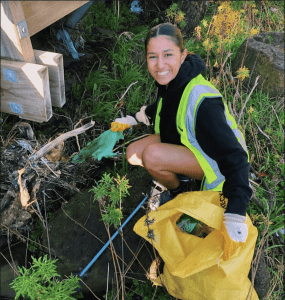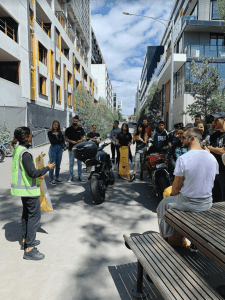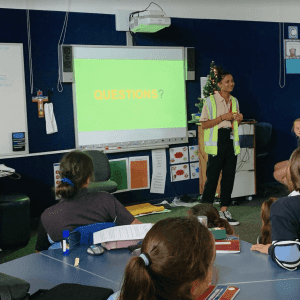




, By Yarra
The YRKA takes notice of members of our community who go above and beyond to make a difference and connect with our vision for a healthy, protected, and loved Yarra. This week, we’d like to shine a spotlight on Candace, who noticed an unreasonable amount of litter in her local area and decided to take matters into her own hands.

Candace Colaco is the leader of a local environmental conservation organisation, the Little Litter Project.
Hey Candace, so nice to meet you. Could you start by telling me a little bit about yourself and a little bit about the little litter project.
I am an environmental science graduate from La Trobe University. I started up this initiative because I was driving back from Uni and I was seeing a lot of rubbish on the side of the freeway. I thought, wait, is anyone actually doing anything about this rubbish? After a couple of months, I realised that it wasn’t getting picked up. There was nothing being done about it. So I called up my local council, and I told them that I kept seeing this rubbish on the side of the freeway. They essentially told me it wasn’t their problem, and that it was VicRoads’ problem. So I called VicRoads, but they told me it was my local council’s problem.
At this point, I knew something had to be done. So I started my own initiative to raise awareness about plastic pollution and managing our waste.
And this initiative is around Brimbank?
I’ve just started off locally. So within my council and through social media like Instagram and Facebook.
What did you want to share with people?
I started first by educating people on the effects of littering and what happens when they recycle vs. when things end up in a landfill. I noticed that I was never seeing anything on social media about environmental awareness or about reducing our waste.
The more I started educating people, the more people got involved. I started cleaning up by myself, and then I noticed a lot of interest in my community. So I started making these clean-up events.
What are the events like?
My first clean-up was last November in Abbotsford. I organised it through Facebook and Instagram. Around 50 people attended and we pulled out about 30 bags of rubbish.
After that about 70 people contacted me wanting to participate. So I have slowly started to build a network with the community and other like-minded organisations.
At the end of the day, it’s our environment. If we don’t take care of it, no one will.

Candace Colaco is the leader of the Little Litter Project, which organises community clean-up events.
How has it progressed since you began?
It’s been a crazy journey. Last year I actually got recognised by the local council for a sustainability award. Getting recognised for my work was rewarding and really motivated me to keep going.
That is wonderful. Have you been able to do anything through COVID, or has it halted your progress?
It’s definitely restricted the amount of things I can do. But I have tried to stay engaged through social media with little tricks and tips that people can use. It’s hard now because of all this PPE. We have had like an increase in the amount of pollution, so I have tried to educate people and do my own cleanups every time I come back from a run or a walk
As they slowly start to ease more restrictions, I will get more people involved. But at the moment, I am just trying to keep on social media and keep as active as possible.
Another thing I wanted to ask you about was how members of the community could get involved with your organisation. How do you recommend people to get involved with you?
My primary platform is through social media. Once restrictions are lifted, I would love for people to get involved with the clean-ups.
How would you recommend people to reduce their plastic waste? Do you have any recommendations or tips?
I think that, where possible, even when it comes to glass jars at home, rather than immediately throwing it in recycling, trying to find other uses for our rubbish. A lot of people think once they throw something in the recycle bin, then that’s the end of their problem as it is 100% going to be recycled. But we can’t just depend on throwing it in the recycle bin.
Even when we go to the supermarket, investing in produce bags and remembering to bring green bags can help reduce the number of shopping bags we use. It is small things like reusable water bottles and masks
Even when we go for a walk, we could pick up just a few pieces of rubbish, and make it normal behaviour.
Even if it’s on someone else’s lawn, even if it is on someone else’s property, we think it isn’t our problem but it is. We have to think about what is best for the community.

Candace Colaco visits local schools to educate them on the effects of littering and how to reduce plastic waste.
You can get in touch with the Little Litter Project on Facebook or Instagram @littlelitterproject.
This interview has been edited for length and clarity.